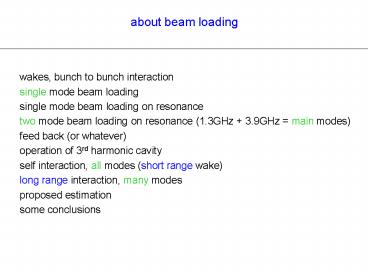about beam loading - PowerPoint PPT Presentation
Title:
about beam loading
Description:
wakes, bunch to bunch interaction. single mode beam loading ... self interaction, all modes (short range wake) long range interaction, many modes ... – PowerPoint PPT presentation
Number of Views:12
Avg rating:3.0/5.0
Title: about beam loading
1
about beam loading
wakes, bunch to bunch interaction single mode
beam loading single mode beam loading on
resonance two mode beam loading on resonance
(1.3GHz 3.9GHz main modes) feed back (or
whatever) operation of 3rd harmonic cavity self
interaction, all modes (short range wake) long
range interaction, many modes proposed
estimation some conclusions
2
multi-bunch beam loading (bunch centroids)
centroid wakes
T bunch distance
systematic part
random part
rms jitter
3
single mode beam loading
with
k, Q, ? loss-parameter, quality, frequency
on resonance, high Q
off resonance, high Q
4
single mode beam loading on resonance, high Q
on resonance, high Q
simple interpretation
with N ?/T the number of bunches
that contribute to the wake
fundamental mode
syst. beam loading
rms beam loading (without FB)
- 0.013
- (TESLA module)
5
two mode beam loading on resonance, high Q
acc. mode (40 TESLA cavities to 500MeV)
3rd harmonic used-mode (32 cavities in 2 modules)
(without FB)
6
fundamental mode with ideal feedback?
bunches 0n ? n
systematic part
random part
relative rms energy spread ?
e.g.
7
operation of 3rd harm. cavity Ibeam 0 (steady
state)
8
operation of 3rd harm. cavity Ibeam 5
mA (steady state)
9
operation of 3rd harm. cavity Ibeam 3
mA (steady state)
10
n0 self interaction (all modes / short range)
rms jitter
systematic part
random part
before BC1
current I_peak ? 50 A
wake of 1.3GHz mode
wake of 5 TESLA modules
wake of 5 TESLA modules 11m active length 3rd
harm.
11
n0 self interaction (all modes / short range)
rms jitter
systematic part
random part
before BC1
12
n?8 steady state (all modes / long range)
with
Rainers table
from Monopole, Dipole and Quadrupole
Passbands of the TESLA 9-cell Cavity R.
Wanzenberg, TESLA 2001-33
estimation
limited to the known modes!
13
proposed estimation (for perfect main-modes
feedback)
long range, modal
short range time domain
e.g. (40 TESLA cavities 45 3rd-harm. cavities)
only TESLA cavity modes (Rainers
list) pessimistic estimation of HOM
absorption (Qext 106, pessimistic enough ???)
? strong contribution from self interaction !
14
some conclusions
systematic beam is loading important comes
always to steady state transients not
investigated now (some unknown
parameters) random beam loading (by charge
fluctuation) main modes feed back required
significant contribution from 3rd harmonic
rf transverse deflecting cavities are not
considered now self interaction Erms/E
qrms/qav 0.0017 self multi-bunch
interaction Erms/E qrms/qav 0.002
(unknown
parameters estimated) interference with
compression process has been investigated
earlier (self interaction) ? constraints for
charge fluctuation































